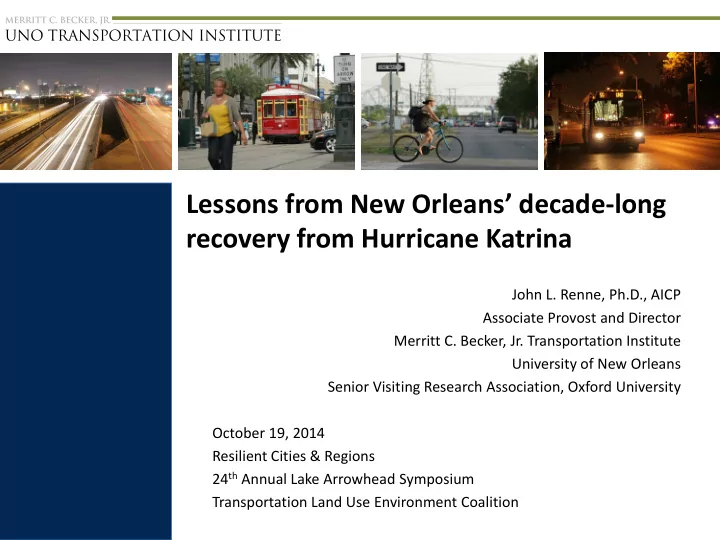

Lessons from New Orleans’ decade-long recovery from Hurricane Katrina John L. Renne, Ph.D., AICP Associate Provost and Director Merritt C. Becker, Jr. Transportation Institute University of New Orleans Senior Visiting Research Association, Oxford University October 19, 2014 Resilient Cities & Regions 24 th Annual Lake Arrowhead Symposium Transportation Land Use Environment Coalition
1. Decades of Policy Towards Environmental Disasters 2. The Hurricane Katrina Disaster Overview 3. A Confusing Recovery Process 4. Local Boom during National Bust 5. The Deepwater Horizon Disaster 6. The Oil and Gas Boom 7. Saving America’s Wetland 8. Promoting Complete Streets and a Resilient Transportation System 2
Loss of Coastal Wetlands During the 20 th century Louisiana lost a total of 1.2 • million acres of land • If this trend continues, by 2050 wetland loss will be greater than the size of Delaware, and the Washington, DC-Baltimore, MD metropolitan area combined. We are losing 44 square miles per year. 3
3
3
3
3
3
3
3
Planning for Recovery • The Urban Land Institute Plan – November 2005 FEMA ’ s ESF 14: Long-term Recovery Planning • • Louisiana Recovery Authority • The Bring New Orleans Back Commission • The New Orleans City Planning Commission • The Lambert Plans • The Unified New Orleans Plan • Office of Recovery Management – Ed Blakely New Orleans Master Plan for the 21 st Century • 12
3
Unified New Orleans Plan IMPLEMENTATION FUNDING UNIFIED PLAN BNOB LOUISIANA UNOP COMMISSION SPEAKS DISTRICT and NEIGHBORHOOD PLANNING` LAMBERT FEMA PLANS ESF-14 INDEPENDENT NEIGHBORHOOD PLANS 14
On, Jan. 8, 2007, Dr. Ed Blakely appointed Director of the Office of Recovery Management Recovery Czar Recovery Strategy: 1. Healing and consultation 2. Improving safety and security 3. 21st century infrastructure reconfiguration 4. Economic diversification 5. Develop a sustainable settlement pattern 15
Targeted Recovery 16
Master Plan 17
Local Boom, National Bust 18
Deepwater Horizon 19
Deepwater Horizon 20
A Transportation Disaster? To put this in the context of the Deepwater Horizon disaster, imagine that seventy percent of the 68,0000 square miles of oil that was floating in the Gulf of Mexico was destined to be consumed by America’s transportation sector. The area covered by the oil intended for the transportation sector would cover an area slightly larger than the entire state of Pennsylvania (47,600 square miles). Perhaps more shocking is that despite the massive amount of oil spilled in Gulf of Mexico, the quantity used just by the transportation sector would be consumed in just under 3 days. 21
A Transportation Disaster? 22
23
Oil and Gas Boom 24
$90+ Billion Investment 25
26
27
Coastal Crusader 28
Declining Transit Service 29
30
100 Miles of Bike Facilities 31
Complete Streets Ordinance 32
33
Transportation Resilience 34
Transportation Resilience 35
Transportation Resilience 36
Emerging Research 37
Thank You!!! John Renne, Ph.D., AICP Associate Provost & Director Merritt C. Becker Jr. Transportation Institute jrenne@uno.edu transportation.uno.edu
Recommend
More recommend